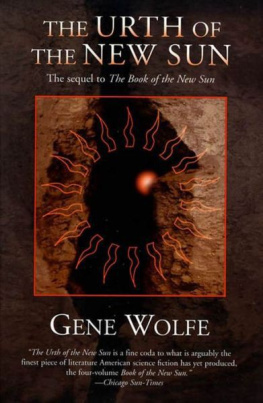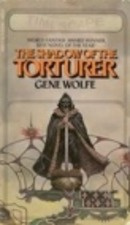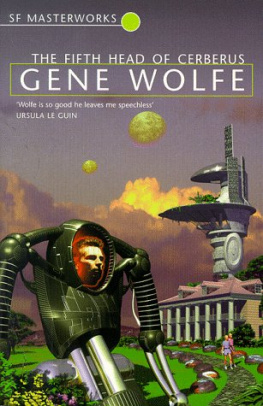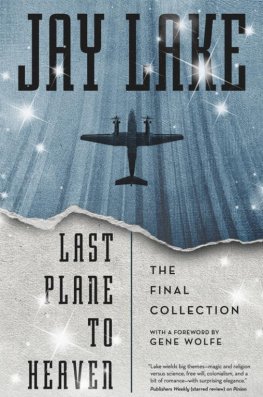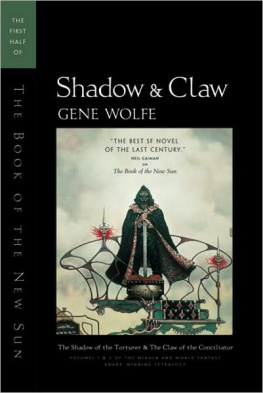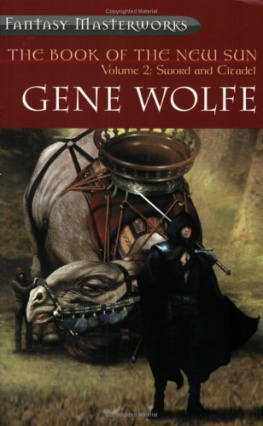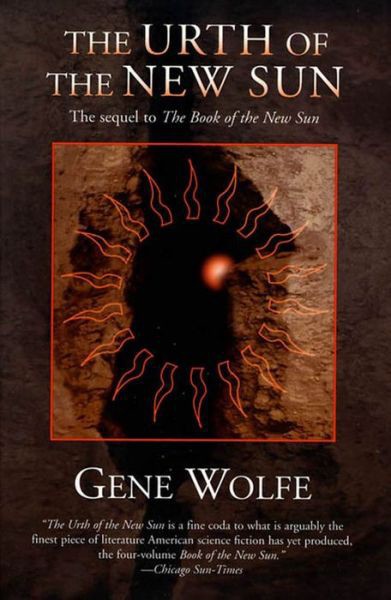The Miracle of Apu-Punchau
NO SORT OF WONDER IS MORE CONVINCING TO THE PRIMITIVE mind than one affecting the presumably immutable workings of the heavens. Severians prolongation of the night, however, may leave less credulous minds puzzling over the ways in which such a marvel might be achieved without a cataclysm greater than that which accompanied the arrival of the New Sun.
At least two plausible explanations could be put forward. Mass hypnosis is invoked by historians to explain all multiply attested wonders that cannot be degraded in any other fashion; but it is something no actual hypnotist offers to produce.
If mass hypnosis is discarded, the only alternative appears to be an eclipse in the broadest sensethat is, the passage of some opaque body between the Old Sun and Urth.
In this context, it should be noted that the stars seen in the skies of the Commonwealth in winter rise in spring over the stone town (presumably due to the precession of the equinoxes); but that during his prolongation of the night Severian sees his accustomed spring stars. This would seem to favor the second explanation, as does the immediate manifestion of the Old Sun, already higher than the rooftops, after the capitulation of the autochthons. Nothing Severian writes indicates what the opaque body may have been; but the thoughtful reader will findlittle difficulty in advancing at least one plausible speculation.
G.W.
The Mainmast
HAVING CAST ONE MANUSCRIPT INTO THE SEAS OF TIME, I now begin again. Surely it is absurd; but I am notI will not beso absurd myself as to suppose that this will ever find a reader, even in me. Let me describe then, to no one and nothing, just who I am and what it is that I have done to Urth.
My true name is Severian. By my friends, of whom there were never very many, I was called Severian the Lame. By my soldiers, of whom I once commanded a great many, though never enough, Severian the Great. By my foes, who bred like flies, and like flies were spawned from the corpses that strewed my battlefields, Severian the Torturer. I was the last Autarch of our Commonwealth, and as such the only legitimate ruler of this world when we called it Urth.
But what a disease this writing business is! A few years ago (if time retains any meaning), I wrote in my cabin on the ship of Tzadkiel, re-creating from memory the book I had composed in a clerestory of the House Absolute. Sat driving my pen like any clerk, recopying a text I could without difficulty bring to mind, and feeling that I performed the final meaningful actor rather, the final meaningless actof my life.
So I wrote and slept, and rose to write again, ink flying across my paper, relived at last the moment at which I entered poor Valerias tower and heard it and all the rest speak to me, felt the proud burden of manhood dropped upon my shoulders, and knew I was a youth no more. Thatwas ten years past, I thought. Ten years had gone by when I wrote of it in the House Absolute. Now the time is perhaps a century or more. Who can say?
I had brought aboard a narrow coffer of lead with a close-fitting lid. My manuscript filled it, as I knew it would. I closed the lid and locked it, adjusted my pistol to its lowest setting, and fused lid and coffer into a single mass with the beam.
To go on deck, one passes through strange gangways, often filled by an echoing voice that, though it cannot be distinctly heard, can always be understood. When one reaches a hatch, one must put on a cloak of air, an invisible atmosphere of ones own held by what appears to be no more than a shining necklace of linked cylinders. There is a hood of air for the head, gloves of air for the hands (these grow thin, however, when one grasps something, and the cold seeps in), boots of air, and so forth.
These ships that sail between the suns are not like the ships of Urth. In place of deck and hull, there is deck after deck, so that one goes over the railing of one and finds oneself walking on the next. The decks are of wood, which resists the deadly cold as metal will not; but metal and stone underlie them.
Masts sprout from every deck, a hundred times taller than the Flag Keep of the Citadel. Every part appears straight, yet when one looks along their length, which is like looking down some weary road that runs beyond the horizon, one sees that it bends ever so slightly, bowing to the wind from the suns.
There are masts beyond counting; every mast carries a thousand spars, and every spar spreads a sail of fuligin and silver. These fill the sky, so that if a man on deck desires to see the distant suns blaze of citron, white, violet, and rose, he must labor to catch a glimpse of them between the sails, just as he might labor to glimpse them among the clouds of an autumn night.
As I was told by the steward, it sometimes happens that a sailor aloft will lose his hold. When that occurs on Urth, the unfortunate man generally strikes the deck and dies.Here there is no such risk. Though the ship is so mighty, and filled with such treasures, and though we are so much nearer her center than those who walk upon Urth are to the center of Urth, yet her attraction is but slight. The careless sailor drifts among the shrouds and sails like thistledown, most injured by the derision of his workmates, whose voices, however, he cannot hear. (For the void hushes every voice except to the speaker himself, unless two come so near that their investitures of air become a single atmosphere.) And I have heard it said that if it were not thus, the roaring of the suns would deafen the universe.
Of all this I knew little when I went on deck. I had been told that I would have to wear a necklace, and that the hatches were so constructed that the inner must be shut before the outer can be openedbut hardly more. Imagine my surprise, then, when I stepped out, the leaden coffer beneath my arm.
Above me rose the black masts and their silver sails, tier upon tier, until it seemed they must push aside the very stars. The rigging might have been cobweb, were the spider as large as the shipand the ship was larger than many an isle that boasts a hall and an armiger in it who thinks himself almost a monarch. The deck itself was extensive as a plain; merely to set foot on it required all my courage.
When I sat writing in my cabin, I had scarcely been aware that my weight had been reduced by seven-eighths. Now I seemed to myself like a ghost, or rather a man of paper, a fit husband for the paper women I had colored and paraded as a child. The force of the wind from the suns is less than the lightest zephyr of Urth; yet slight though it was, I felt it and feared I might be blown away. I seemed almost to float above the deck rather than to walk on it; and I know that it is so, because the power of the necklace kept outsoles of air between the planks and the soles of my boots.

